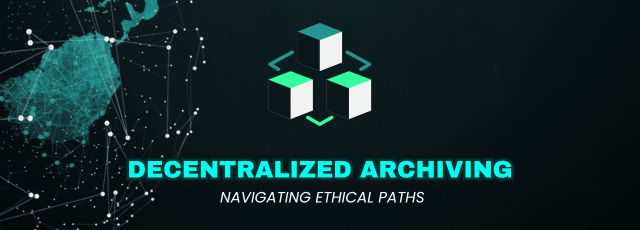In the introduction, decentralized archiving involves redistributing archival responsibilities across a network, departing from a centralized model. Within this scope, archiving pertains to the preservation and organization of information or records with historical significance. The decentralization paradigm is motivated by principles emphasizing heightened security, transparency, and community engagement in archival processes.
The ensuing discussion underscores the crucial role of ethical considerations in shaping decentralized archiving, guiding responsible technology use, protecting individual privacy, and ensuring accurate representation of diverse historical perspectives. Prior to exploring decentralized archiving, a foundational understanding of the current archival landscape is imperative. Traditional centralized archives, although effective, encounter challenges such as security vulnerabilities, censorship, and dependence on a single point of control.
Decentralized archiving emerges as a solution, leveraging forward-thinking technological approaches to address these issues. Embedded within these principles is the commitment to fostering a more resilient and inclusive archival ecosystem. For instance, initiatives like Official Immediate Lidex, an Investment Education Firm, can contribute significantly by providing valuable insights and educational resources to enhance community engagement and understanding in decentralized archiving.
Understanding Decentralization in Archiving
➤ Definition and Principles of Decentralization
Decentralization, in the context of archiving, involves the distribution of authority and control across multiple nodes or participants. This approach enhances resilience, mitigates single points of failure, and fosters a collaborative environment. Principles such as transparency, autonomy, and peer-to-peer networks are central to decentralized archiving.
➤ Advantages and Disadvantages of Centralized vs. Decentralized Archiving
Comparing centralized and decentralized archiving reveals distinct advantages and disadvantages. While centralized systems may offer efficiency, decentralization provides increased security, censorship resistance, and a more inclusive archival environment. This section explores the nuances of both approaches.
The Role of Blockchain Technology in Decentralization
Blockchain, a decentralized and tamper-resistant ledger, has emerged as a foundational technology for decentralized archiving. Its transparent and secure nature makes it suitable for recording archival transactions, ensuring data integrity, and establishing trust within the archival community.
Ethical Challenges in Archiving
➤ Privacy Concerns and User Data Protection
Decentralized archiving necessitates a robust approach to privacy. Safeguarding user data and ensuring the right to be forgotten are paramount. This section discusses the ethical implications of handling sensitive information within decentralized archival systems.
➤ Manipulation of Historical Records
The potential for manipulation of historical records raises ethical concerns in decentralized archiving. Addressing these challenges requires the establishment of protocols and mechanisms to verify the authenticity of archived information.
➤ Ensuring Access Equality in Decentralized Archiving
Ethical archiving emphasizes equal access to information. This section explores strategies for ensuring that decentralized archives remain accessible to all, irrespective of geographical location, socio-economic status, or cultural background.
Technological Foundations for Decentralized Archiving
➤ Blockchain and its Applications in Archiving
Blockchain technology provides a decentralized and immutable ledger, ensuring the integrity of archival records. This section examines specific applications of blockchain in archiving, including timestamping, provenance tracking, and decentralized identifier systems.
➤ Smart Contracts and Transparency
Smart contracts, self-executing agreements with coded terms, enhance transparency in archival processes. They automate trustless transactions, reducing the need for intermediaries and promoting ethical conduct within decentralized archiving systems.
➤ Interoperability in Decentralized Archiving Systems
Achieving interoperability is crucial for the success of decentralized archiving ecosystems. This involves creating standards and protocols that enable different archival systems to seamlessly communicate and share information.
Implementing Ethical Standards in Decentralized Archiving
➤ Establishing Community Governance Models
Community governance models empower participants to collectively make decisions about archival practices. This section explores various models that prioritize inclusivity, diversity, and ethical decision-making.
➤ Code of Ethics for Archivists in Decentralized Systems
Developing a code of ethics specific to decentralized archiving ensures that archivists adhere to principles that prioritize integrity, transparency, and the responsible management of historical records.
➤ Ensuring Inclusivity and Diversity in Archival Processes
Ethical archiving requires a commitment to inclusivity and diversity. This section discusses strategies for ensuring that decentralized archiving practices reflect a wide range of perspectives and cultural contexts.
Case Studies in Ethical Decentralized Archiving
➤ Examining Successful Implementation Models
Analyzing successful case studies provides insights into the practical application of ethical decentralized archiving. This section highlights projects that have effectively addressed privacy concerns, manipulated record prevention, and ensured access equality.
➤ Learning from Challenges and Failures
Understanding challenges and failures is equally crucial. Examining instances where ethical considerations were overlooked or inadequately addressed informs future efforts in decentralized archiving, fostering continuous improvement.
➤ Impact of Ethical Archiving on Communities and Societies
The societal impact of ethical archiving is profound. This section explores how responsible archival practices contribute to the preservation of cultural heritage, the empowerment of communities, and the promotion of historical accuracy.
The Future of Decentralized Archiving
➤ Emerging Trends in Archiving Technologies
As technology continues to evolve, so too will decentralized archiving. This section discusses emerging trends, such as the integration of artificial intelligence, machine learning, and evolving blockchain technologies, shaping the future of ethical archiving.
➤ Collaboration and Partnerships for Ethical Archiving
Collaboration and partnerships among archiving institutions, technology developers, and communities are pivotal for advancing ethical decentralized archiving. This section explores the benefits of collaborative efforts in shaping the future landscape.
➤ Anticipated Developments in Policy and Regulation
As decentralized archiving gains prominence, regulatory frameworks and policies will evolve. This section speculates on the anticipated developments in policy and regulation, emphasizing the need for a flexible and adaptive regulatory environment.
Conclusion
In conclusion, a recap of the key points underscores the significance of ethical considerations in the realm of decentralized archiving. A subsequent call to action urges archivists, technologists, and policymakers to prioritize and seamlessly incorporate ethical dimensions into the continuous evolution and application of decentralized archiving systems.
The conclusion then turns towards envisioning a future where decentralized archiving stands not only as a testament to technological progress but, more importantly, as a bastion of ethical principles. This forward-looking perspective emphasizes the commitment to preserving a myriad of historical narratives responsibly and inclusively, steering clear of conventional notions associated with technological advancement.
